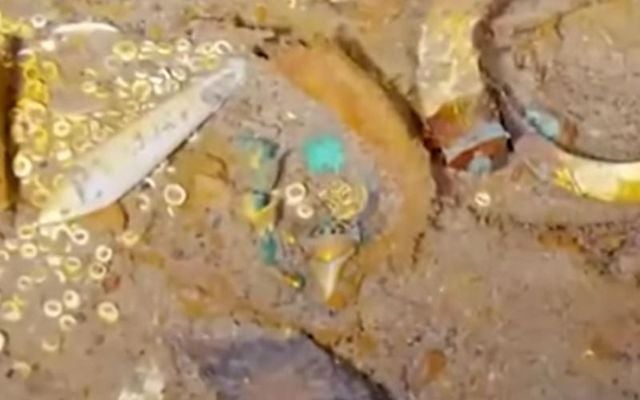A digital scan carried out in 2023 revealed a necklace carrying the tooth of a prehistoric megalodon shark in the wreckage of the Titanic.
The scan, which was carried out by deep water investigation company Magallen in May 2023, revealed a gold necklace featuring the tooth of the prehistoric shark, which lived more than 23 million years ago.
Magallen CEO Richard Parkinson described the discovery as "astonishing, beautiful, and breathtaking".
"What is not widely understood is that the Titanic is in two parts and there’s a three-square-mile debris field between the bow and the stern," Parkinson told ITV last week.
"The team mapped the field in such detail that we could pick out those details."
The company is carrying out a full-size digital scan of the Titanic wreckage, adding that it is the largest underwater scanning project in history.
As part of the project, Magallen and filmmakers at Atlantic Productions are attempting to create an "exact digital twin" of the wreckage for the first time ever.
Read more
Magallen used two submarines to produce around 700,000 images of the wreckage, which were then converted into a moving scan.
The rare necklace, however, will never be recovered from the wreckage due to an agreement between the UK and US Governments that prevents members of the public from removing artifacts from the wreckage and the surrounding seabed.
However, Magallen is attempting to discover who owned the necklace by using artificial intelligence to reach out to family members of the 2,200 passengers who were traveling on the Titanic when it sank in the Atlantic Ocean on April 15, 1912.
Artificial Intelligence analyzed footage of passengers boarding the ship, using facial recognition technology to catalog the clothing they were wearing. Once analysts determine which passenger was wearing the necklace, Magellan will be able to reach out to their relatives.
Check out this video of the necklace still sitting at the bottom of the Atlantic Ocean with the Titanic:
* Originally published in June 2023, updated in April 2025.




Comments